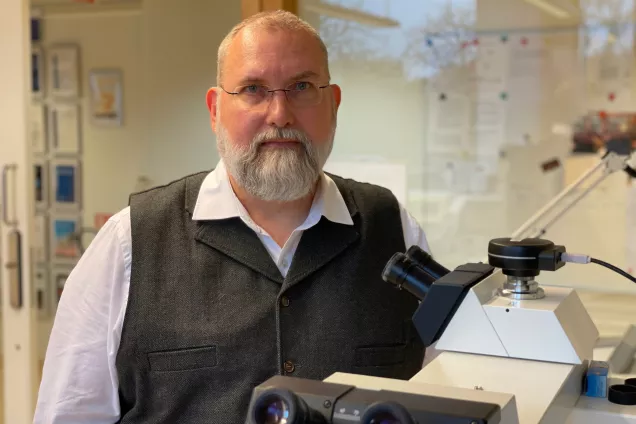Experimental Cardiovascular Research
Harry Björkbacka’s group
Cardiovascular disease is the number one cause of death in people living with diabetes, and people with diabetes are twice as likely to have heart disease or suffer a stroke than people without diabetes.
Cardiovascular disease is mainly caused by atherosclerosis, which is characterized by lipid deposition, chronic inflammation, immune cell accumulation, and fibrosis of the vessel wall of large and medium sized arteries. When these atherosclerotic plaque deposits occasionally erode or rupture, they can cause the blood to clot and restrict blood flow, with serious clinical consequences such as acute myocardial infarctions and strokes. It is unclear how the atherosclerotic disease process is different in people with diabetes. It has been suggested that increased low-grade inflammation and impaired fibrotic repair explain why people with diabetes are more likely to suffer from cardiovascular disease.
More effective risk factor intervention combined with better management of acute cardiovascular events have decreased cardiovascular mortality over the last decades. However, the burden on society caused by the cardiovascular complications of diabetes will continue to increase as the global population is aging and the number of people with diabetes is rising. One way to ease the burden is to identify interventions that specifically target disease mechanisms in atherosclerosis. Our research aims to uncover relevant targets for intervention.
The research of this research group is divided into three major fields of research:
- Cardiovascular Research – Immunity and Atherosclerosis
- Cardiovascular Research – Cellular Metabolism and Inflammation
- Cardiovascular Research – Matrix and Inflammation in Atherosclerosis
Aims
The aim of our research is to understand the interplay between molecular, cellular, metabolic, and immunological mechanisms contributing to atherosclerotic cardiovascular disease. We then aim to define biomarkers and to develop interventions that are specifically targeted towards these mechanisms to improve diagnosis, prognosis, and treatment of atherosclerotic cardiovascular disease.
Impact
The experimental cardiovascular research group has a long history of studying immune mechanisms in atherosclerosis, diabetes, and cardiovascular disease. The group has defined epitopes on apolipoprotein B-containing lipoproteins targeted by immunoglobulins, and have shown that plasma levels of these immunoglobulins can predict future cardiovascular disease. The group has also studied the role of regulatory T cells in atherosclerosis development and revealed associations between monocytes and T cell subsets and future cardiovascular disease. We have also discovered that changes in cellular metabolism is associated with the risk profile of atherosclerotic plaques. Several of these findings have been explored for potential clinical interventions together with pharmaceutical partners. Therapies targeting atherosclerotic disease mechanisms will play a critical role in reducing the risk of cardiovascular complications in diabetes beyond what can be achieved by managing risk factors and doing life style interventions.
Research output
Link to a list of research output within Cardiovascular Research – Immunity and Atherosclerosis
Link to a list of research output within Cardiovascular Research – Cellular Metabolism and Inflammation
Link to a list of research output within Cardiovascular Research – Matrix and Inflammation in Atherosclerosis
Team members
Link to a list of team members within Cardiovascular Research – Immunity and Atherosclerosis
Link to a list of team members within Cardiovascular Research – Cellular Metabolism and Inflammation
Link to a list of team members within Cardiovascular Research – Matrix and Inflammation in Atherosclerosis
Current major grants
- Medicine and health grant from the Swedish Research Council 2021-2024
- Medicine and health grant from the Swedish Research Council 2022-2024
- Prince Daniel’s research grant for promising young researchers from the Swedish Heart-Lung Foundation 2021-2023
- Research project grant from the Swedish Heart-Lung Foundation 2023-2025
- Research fellowship grant from the Swedish Heart-Lung Foundation 2020-2025

Harry Björkbacka
Principal Investigator
Senior Lecturer
+46 (0)40 39 12 05
harry [dot] bjorkbacka [at] med [dot] lu [dot] se
Harry Björkbacka’s profile in Lund University’s research portal
Affiliations
EXODIAB: Excellence of Diabetes Research in Sweden

